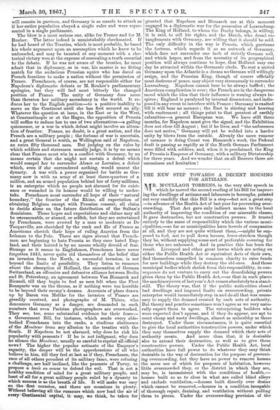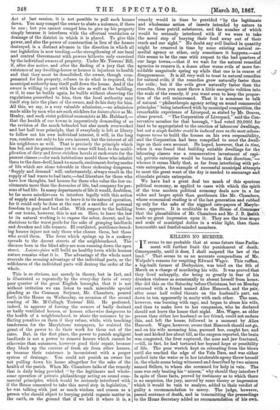THE NEW STEP TOWARDS A DECENT HOUSING FOR ARTIZANS.
IR. lit'CULLAGH TORRENS, in the very able speech in
which he moved the second reading of his Bill for improv- ing the dwellings of artisans and labourers in boroughs, pointed Out very candidly that this Bill is a step—but not a great step —in advance of the Health Act of last year for preventing over- crowding. That Act gave only indirect means to the local authority of improving the condition of our miserable classes. It gave destructive, but not constructive powers. It trusted entirely to the sense of responsibility which the various muni- cipalities,—so far as municipalities have bowels of compassion at all, and they are not quite without them,—might be sup- posed to feel, not to pull down houses, fever-stricken though they be, without supplying some sort of preferable covering for those who are unhoused. And in practice this has been the result. Liverpool and other great towns which are acting on either the Public Health Act or equivalent Acts of their own, find themselves compelled in common charity to raise funds for new buildings while they destroy the old ones. And those municipal bodies which shrink from this responsibility, in con- sequence do not venture to carry out the demolishing powers given them by the Public Health Act,—so that in such places the machineryeven of lastyear's Act comes absolutely to a stand- still. The theory was, that if the public authorities closed bad dwellings and imposed limits on overcrowding, private enterprise would immediately step in and do all that was neces- sary to supply the demand created by such acts of authority. But theory and practice sometimes won't agree as we very natu- rally expect them to agree. The enterprising builders who were expected don't appear, and if they do appear, are apt to erect cheap and nasty dwellings, almost as unhealthy as those destroyed. Under these circumstances, it is quite essential to give the local authorities tonstructive powers, under which they may themselves supply the demand which their acts of authority create. And more than that, it is desirable also to extend their destructive, BA well as to give them constructive powers. Under the Public Health Act, local authorities have full power to do whatever they may think desirable in the way of destruction for the purpose of prevent- ing overcrowding, but they have no power to remove houses the mere use of which for purposes of habitation, however little overcrowded they, or the district in which they are, may be, is inconsistent with the conditions of health,— houses built so as to close in what are called blind alleys and exclude ventilation,—houses built directly over drains which cannot be removed,—houses in a condition incapable of thorough repair, draining, and ventilation without pulling them to pieces. Under the overcrowding provision of the Act of last session, it is not possible to pull such houses down. You may compel the owner to abate a nuisance, if there be one ; but you cannot compel him to give up his property simply because it interferes with the effectual ventilation or drainage of the district in which it is placed. To give this power, and also the power of construction in lieu of the houses destroyed, is a distinct advance in the direction in which all our legislation is now tending,—the strengthening of our local and central Government with powers hitherto only exercised by the individual owners of property. Under Mr. Torrens' Bill, if, after due notice, and after the finding of a jury that the existence of any dwelling-house or houses is injurious to health and that they must be demolished, the owner, though com- pensated for his property, refuses to do what is required, the municipal authority may itself pull down the house. And if the owner is willing to part with the site as well as the building, or if, in case he builds again, he builds without observing the regulations prescribed to him, then the local authority may itself step into the place of the owner, and do his duty for him.
All this, we say, is a very valuable admission,—an admission made alike by men who are such sticklers for laissez-faire as Mr.
Henley, and such strict political economists as Mr. Hubbard,— that the health of our towns is imperatively demanding of us the revision of the much belauded but also much overworked and but half true principle, that if everybody is left at liberty to follow out his own individual interest, it will, in the long run, conduce not only to his own interest, but the interest of all his neighbours as well. That is precisely the principle which has led, and for generations yet to come will lead, to the multi- plication of dirty and fever-stricken hovels at rack-rents for the poorest classes ;—for such habitations mould those who inhabit them to the dare-devil, hand-to-mouth, excitement-loving modes of life which are alone tolerable in these sickening dungeons. Supply and demand' will, unfortunately, always result in the supply of bad wares to bad taste,—bad literature for those who have low thoughts, bad houses for those who value the low ex- citements more than the decencies of life, bad company for per- sons of bad life. In many departments of life it would, doubtless, be far more mischievous to interfere legally with this action of supply and demand than to leave it to its natural operation, for it could only be done at the cost of a sacrifice of personal freedom to good and bad alike. With respect to the building of our towns, however, this is not so. Here, to leave the law to its natural working is to expose the sober, decent, and in- dustrious to the worst perils for the sake of grasping landlords and drunken and idle tenants. El ventilated, pestilence-breed- ing houses injure not only those who choose them, but those who avoid them. The fever which springs up in a rookery spreads to the decent streets of the neighbourhood. The diseases born in the blind alley are soon running down the open street. Laissez-faire will build no healthy town while human nature remains what it is. The advantage of the whole must overrule the seeming advantage of the individual parts, or the selfishness of the individual parts will destroy the order of the whole.
This is so obvious, not merely in theory, but in fact, and is illustrated so repeatedly by the every-day facts of every poor quarter of the great English boroughs, that it is not without irritation we can listen to such miserable special pleading as the Common Seijeant, Mr. Chambers, poured forth in the House on Wednesday, on occasion of the second reading of Mr. M'Cullagh. Torrens' Bill. He professed, indeed, to approve of forcing the owners of badly drained or badly ventilated houses, or houses otherwise dangerous to the health of a neighbourhood, to abate the nuisance by in- flicting penalties on them if they refuse, while, with touching tenderness for the Marylebone ratepayers, he resisted the grant of the power to do their work for them out of the rates. But, in the first place, the power to punish negligent landlords is not a power to remove houses which cannot be otherwise than nuisances, however good their repair, because they block up the current of fresh air from other houses, or because their existence is inconsistent with a proper system of drainage. You could not punish an owner for not puffing down his house altogether for the sake of the health of the parish. When Mr. Chambers talks of the remedy that is daily being provided "by the legitimate and whole- some operation of private philanthropy acting on sound com- mercial principles, which would be seriously interfered with if the House consented to take this novel step in legislation," he was talking with just as much wisdom and reason as a person who should object to burying putrid organic matter in the earth, on the ground that if we left it where it is, a remedy would in time be provided "by the legitimate and wholesome action of insects intended by nature to live on these putrid substances, and the number of which would be seriously interfered with if we were to take the novel step of burying their food away out of their reach and our sight." No doubt any evil limited in quantity might be removed in time by some existing natural re- medial agency or other, only sometimes it happens,—and this seems to be the case with respect to the bad quarters of our large towns,—that if we wait for the natural remedial agencies to remove it, a dozen other worse evils of more for- midable magnitude spring up while that one is in course of disappearance. It is all very well to trust to natural remedies for natural evils, if the remedies grow naturally faster than the evils ; but if the evils grow naturally faster than the remedies, then you must throw a little energetic volition into the scale of the remedy, if you want even to keep the propor- tion of the evil unincreased. That it is nonsense to talk of natural " philanthropic agency acting on sound commercial principles" being interfered with by municipal competition, the remarkable experience of Liverpool, as stated by Mr. Graves, alone proved. "The Corporation of Liverpool," said the Con- servative member for that borough, "had voted 20,000/. for land to be appropriated to the erection of labourers' dwellings, but not a single builder could be induced even on the most advan- tageous terms to build the houses on his own responsibility, and the Corporation had been compelled to erect the dwell- ings on their own account. He hoped, however, that in time, when it was found that building suitable dwellings for the labouring classes was a remunerative investment of capi- tal, private enterprise would be turned in that direction," whence whence it seems likely that, so far from interfering with pri- vate enterprise, the example of successful municipal attempts to meet the great want of the day is needed to encourage and stimulate private enterprise.
We have had a great deal too much of this spurious political economy, as applied to cases with which the spirit of the true modern political economy deals now in a far wider and larger spirit than gentlemen like Mr. Chambers, whose economical reading is of the last generation and rubbed up only for the sake of the niggard rate-payers of Maryle- bone, approve. It is creditable to the House of ,Commons that the plausibilities of Mr. Chambers and Mr. J. B. titaiith made no great impression upon it. They see the true scope and scale of municipal duties in a wider light, than those honourable and fearful-minded members.



































 Previous page
Previous page